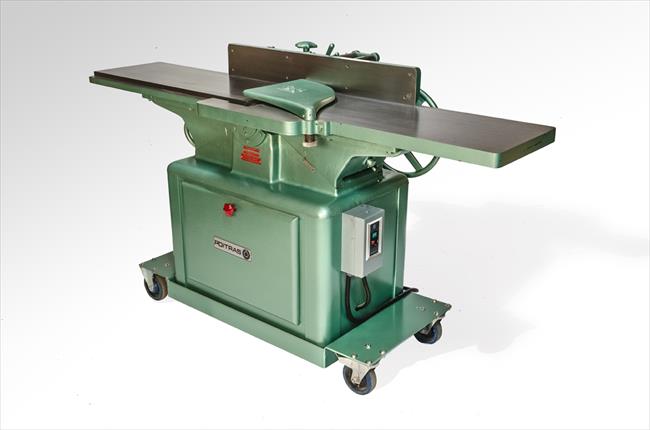This Quebec maker of high-quality woodworking machinery was founded in 1920. There were originally three divisions: a school furniture manufacturer, the woodworking machinery manufacturer, and an iron foundry. In 1980 the foundry was spun off into a separate company.
In 1987 the woodworking machinery division was purchased by General Manufacturing Co.
Machines from this respected Quebec maker (in French, Jos Poitras et Fils) are a common sight in Quebec and Eastern Ontario. A typical (earlier) label reads,
JOS. POITRAS & FILS, Limitée
MANUFACTURIERS DE MACHINERIES
DESSINATEURS–MODELEURS–FONDEURS–MECANICIENS
L'ISLET STATION, P.Q.
Some machines also have a badge in the form of a crest with "JPF" on the diagonal and a couple of gears in the background.
We have not yet seen any Poitras catalogs from before 1950. One early product not seen in those later catalogs is a 20-inch planer that rather looks like a 19th century design (this planer was apparently made by St. Anselme Foundry; we do not know if Poitras also made this same planer or if the examples we have seen were mis-attributed to Poitras). From the 1950 catalog onwards, Poitras products evolved towards more sophisticated and elegant designs. Many products were aimed at the Quebec furniture industry: single-end tenoners, dowel making machine, large veneer press, saddle seat machine. Poitras did not make the heavy production machines like those from P. B. Yates Machine Co. and Canada Machinery Corp.; rather, they focused on light industrial machines. They made a line of drill presses, including models adapted for mortising, but these must not have been successful as they are uncommon in today's used market. Their 12-inch planer, while not as common as the 14-inch General planer, is ruggedly built, and despite its small size is capable of planing all day in a factory setting. Their 12-inch jointer was especially popular, as were their 12-inch tablesaws and 24-inch bandsaw.

Model 4800 12-inch jointer, restored by Jacques Lagueux
Poitras machine designs are surprisingly varied. Earlier machines have utilitarian designs whereas later machines had, by woodworking machinery standards, clean lines and straightforward but effective mechanicals. One later machine, the model V-154 radial arm saw, seems substantially more complex and sophisticated in design than other Poitras products. It would be interesting to know more about how that radial arm saw was developed.
For more information on Poitras serial numbers, see the Products tab, which also provides a table of Poitras products and parts availability information.
We are especially interested in this company. If you can provide any additional information at all, please contact us!
Parts availability
General Manufacturing Co. has some parts for Poitras machines, and can also provide some parts lists and drawings. See the Products tab for more information.
Some of the last Poitras machines, dating from 1980 to '88, were rebadged European machines, possibly all made by Scheppach. For example, we have seen a Poitras LSE-600 6-inch belt sander that is a rebadged Scheppach LSE-600. The LEADER 260 combination machine and LEADER 460 pin router may also have been made by Scheppach, and parts may still be available through them.
Information Sources
- The information on General support of Poitras comes from General via correspondents who relayed to us what they learned.
- Thanks go to Vincent Rochette for providing us the full name and company location, which allowed us to better research the company.
- The March 2002 issue of the French-language magazine, La Revue L'Express Économique (a publication of Chambre de Commerce Kamouraska - l'Isle), contained an article on "Fonderie Poitras" (Poitras Foundry). Translated, the paragraph on the company's history says, "Joseph Poitras founded a company in Islet, in 1920, under the name of Jos Poitras and Sons. The company had three divisions: school furniture manufacturer, woodworking machinery manufacturer, and iron foundry. In 1980, the foundry division was spun off as Fonderie Poitras ltée."
- A search of Canadian patents revealed a couple of school furniture patents awarded to a Leonard Poitras. There were no other patents that looked to be related to this firm.
- An article in an online Quebec encyclopedia provides a history:
La présence de la fonderie a un effet d’entraînement sur d’autres industries de L’Islet-Station. À l’entreprise Nilus Leclerc, fabricant de métiers à tisser, établi près de la gare en 1906, s’ajoutent Jos. Poitras & Fils, un établissement spécialisé dans la fabrication de machinerie et des moteurs électriques avant de se lancer dans le mobilier scolaire, L’Islet Métal, qui fabrique des meubles de cuisine et de parterre, et quelques autres par la suite. Devenue une municipalité autonome, en 1950, L’Islet-Station compte alors environ 150 maisons et un millier d’habitants.
The English translation follows, courtesy of Claude Godcharles.The foundry's presence had a driving effect on other industries at L'Islet-Station. The Nilus Leclerc enterprise, maker of looms, was established near the train station in 1906. Then was added Jos. Poitras & Fils, a business specialising in the manufacture of machinery and electrical motors before going into school furniture. Also L'Islet Metal, who manufactured kitchen and patio furniture, and later a few more varieties. When it became an independant municipality in 1950, L'Islet-Station had about 150 houses and 1000 inhabitants.
- An owwm.org forum discussion contains useful information on the rebuilding of a Poitras Model 6000 12" planer.